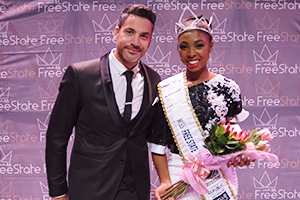
Phemelo Lekale, a second-year BCom Accounting
student at the University of the Free State, is the
newly crowned Miss Free State 2017.
Photo: Wiaan Coffee Photography
“To me, this pageant is about empowering young women. It helped me realise my strengths and weaknesses; it taught me how I can overcome my weaknesses and use my strengths to the best of my ability.”
This is exactly what second-year BCom Accounting student Phemelo Lekale sets out to do during her reign as Miss Free State 2017.
Bring about change and make a difference
The Miss Free State pageant aims in assisting young women to reach out to their communities and charities to bring about change. The pageant also aims to make a difference in somebody’s life.
Phemelo, who takes over from last year’s Kovsie winner Mienke van Rooyen, said that she needed to grow and learn as an individual, and that is exactly what the Miss Free State platform gave her.
Excited about the opportunities lying ahead
When the announcement was made, Phemelo was filled with so many mixed emotions she only realised she was the new Miss Free State when Mienke handed over the sash. “It felt like someone was saying ‘yes, I believe in you and the vision that you proposed to bring to the table’.”
Phemelo said she was excited about the opportunities that came with being Miss Free State and the impact that this brand would have on society. “By the end of my reign, I won’t be the same woman I was when I entered and neither will I be the same woman I was when I won the crown.”